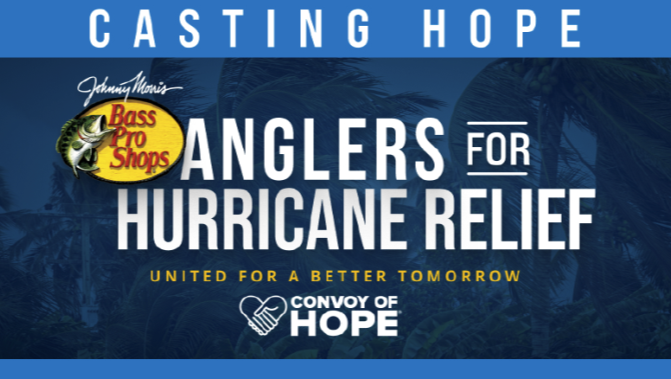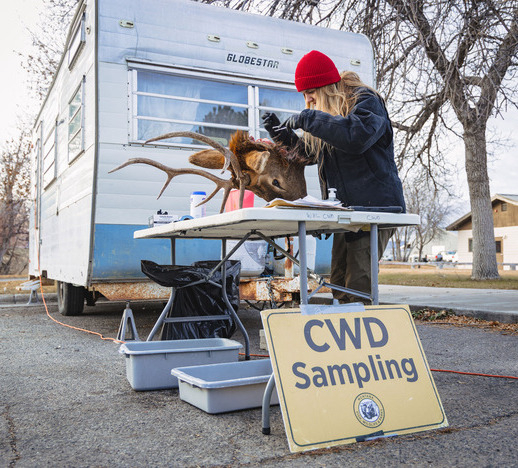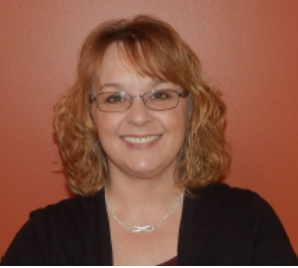Hurricane Helene Aid in North Carolina
By Glen Wunderlich
Charter Member Professional Outdoor Media Association (POMA)
Like millions of people, I watched television in horror, as the folks in North Carolina were reeling from the destruction of Hurricane Helene. In one clip, a woman on the TV news remarked how people were driving by her place taking pictures of victims like they were animals in a zoo. She stated nobody would stop to lend a hand. I realized I was no better than the tourists, as I had done no more than watch the desperate situation that had developed. No roads, no bridges, no communication, no power, which also meant no water – other than the polluted water that covered the landscape.
When our daily newspaper arrived, The Argus-Press of Owosso, Michigan, highlighted Wheeler’s trucking company that was asking for donations to fill a semi-trailer with supplies that were to be transported to the stricken area. My wife and I pitched in with various supplies headed for the South, but it didn’t seem like much of a contribution. They needed people, too!
Franklin Graham was pleading for help, on behalf of Samaritan’s Purse; he was talking to me. Next thing I knew, I had signed up as a volunteer and was eagerly attempting to find accommodations through the volunteer organization but couldn’t seem to make the website cooperate. When I finally called them, I learned they were overwhelmed with people and had no way to put a roof over my head for a few days. However, I was given a phone number of a church contact in Black Mountain. Days passed with no return call, but finally a call from David Dodge of the Grovestone Baptist Church, who had room for me.
I loaded up the Chevy Equinox with supplies and gear then drove over 800 miles through Ohio, West Virginia, and Virginia stopping only for fuel. Arriving at the church, I was led to a stark basement room that was to be my home for a few days. It was perfect for this self-contained outdoorsman with a bathroom adjacent to the room. Although Mr. Dodge indicated there was no running water upon my initial telephone call, not only did they have electricity, but they were able to get running water. And, church members prepared jambalaya and spaghetti dinners for volunteers.
I set up my cot, sleeping bag and pillow and was ready for an overnight recharge, until I was subjected to a foul smell of fuel on my pillow. Apparently, the odor was from an oil lantern that had leaked during transport and I was forced to toss the pillow aside. A rolled-up blanket would suffice.
The next morning, the smell of coffee was in the air and I had a cup, while getting briefed by other volunteers stationed at the church. Strange to the area, I followed two volunteers to a distribution center in Asheville – one of the hardest hit areas anywhere.
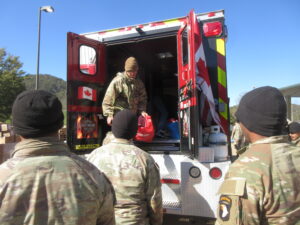
Medical Supplies Arrive
Already, a large group of volunteers – including police from Raleigh – were organizing for the day’s events. Many would remain at the site of a large Harley Davidson’s motorcycle dealership that had been flooded out of business and converted to a center to receive and distribute supplies. Also, on hand were cadaver dogs and their handlers, shortly to be joined by a contingent of U.S. Army personnel for recovery efforts and on-site help with supplies. This gathering would become my worksite for the next two days.
People from the area and beyond would show up with their donations that had to be sorted and placed in large corrugated cardboard boxes called Gaylord boxes, while other were there to haul these life-saving items to their particular destinations. Even though there were ample people to help, it became obvious to me that clutter from emptied boxes and storage tubs had to be managed or everyone would be tripping over the discarded containers. I found my lot in the confusion by breaking down boxes and stacking the folded cardboard out of the way, along with myriad plastic tubs and bags used to bring supplies to the site.
The mountain of goods had to be sorted, so that orders from victims could be filled quickly. The Gaylord boxes, which each held approximately 65 cubic feet of food and gear, had to be filled with specifics in each box to expedite delivery by helicopters and ground vehicles. On hand was all manner of canned goods, clothing, sleeping gear, tents, generators, chain saws, fuel, water and medical items and so forth.
I spoke to several people loading supplies into personal vehicles to be shuttled to mountainous areas. One group had a most beaten-up pickup truck and had loaded many cases of bottled water and towed a large trailer being stocked with generators and fuel.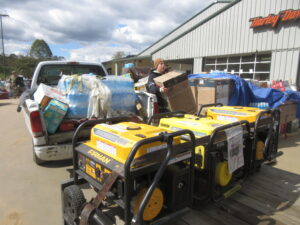 The men were from Michigan and were supplying folks in higher elevations. One may think of North Carolina as being in a relatively warm environment, but one of the Michiganders noted that it had snowed the night before. It was no mystery why cold-weather clothing was needed. In addition, the volunteer mentioned that their tent camp amid mountain residents had consumed some 300 gallons of fuel just to keep warm the day before!
The men were from Michigan and were supplying folks in higher elevations. One may think of North Carolina as being in a relatively warm environment, but one of the Michiganders noted that it had snowed the night before. It was no mystery why cold-weather clothing was needed. In addition, the volunteer mentioned that their tent camp amid mountain residents had consumed some 300 gallons of fuel just to keep warm the day before!
By my second day on the ground effort, I spoke to a young lady named Rae, who was one of the cadaver dog handlers and learned that the distribution center was going to be vacated and moved to another area. She was shut down as were other dog handlers.
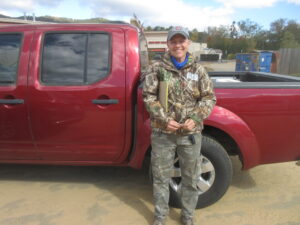
Cadaver dog handler, Rae
Eventually, we ran out of wood pallets and Gaylord boxes and were left with piles of goods that remained on site in a heaping mess. Goods were not going out fast enough, as piles continued to grow. For the record, I worked shoulder-to-shoulder with the military personnel and to a person they were all exceedingly polite and willing to work for the cause. I’ve never been called “Sir” so many times in my life!
I’ll not show pictures or videos of the devastation encountered in my travels, because anyone can see for themselves the carnage through YouTube and other sites. However, help will be needed for years before the new normal becomes reality.



